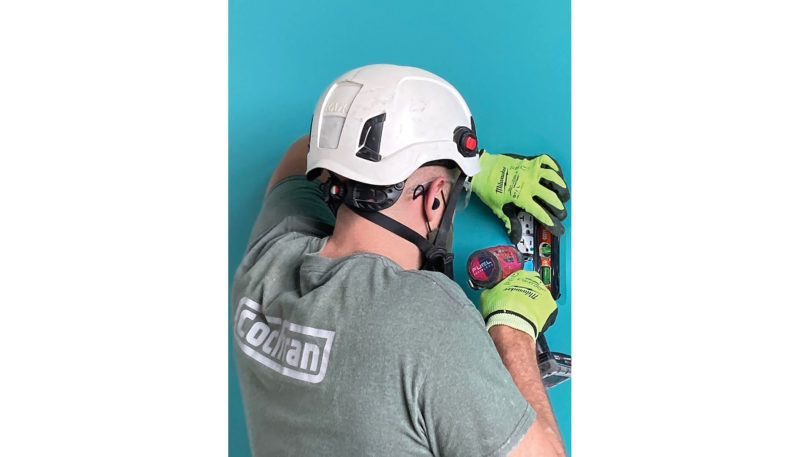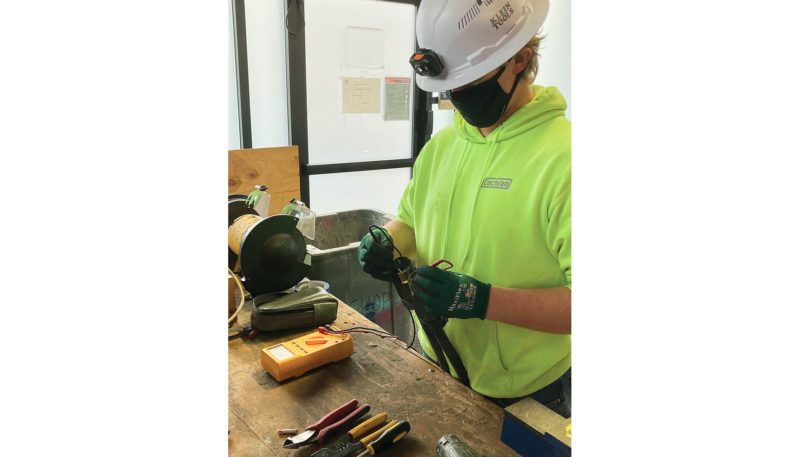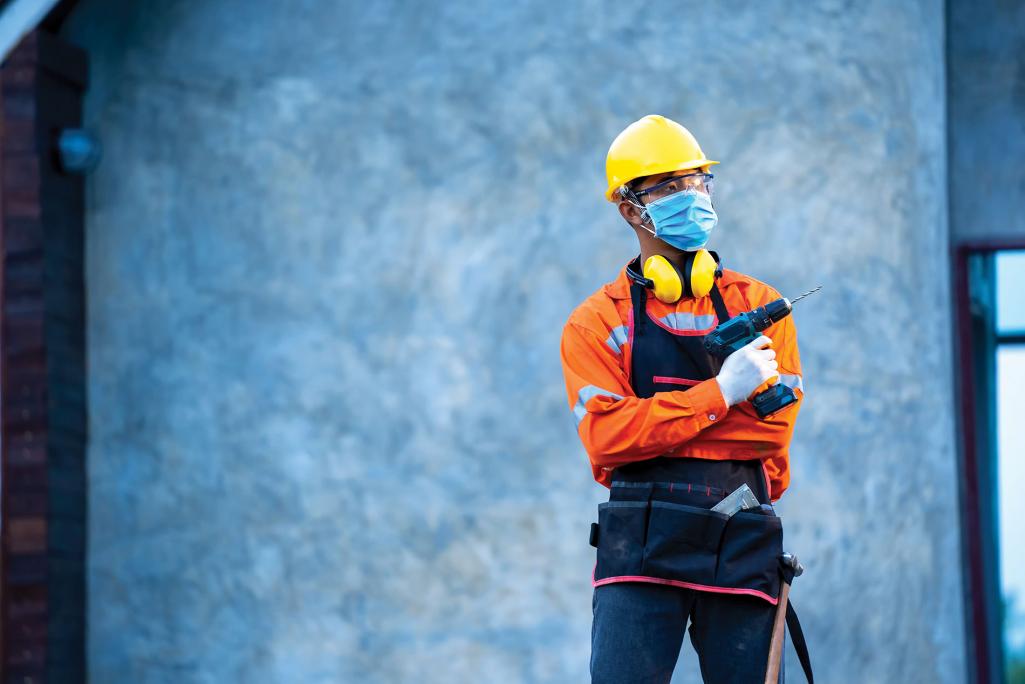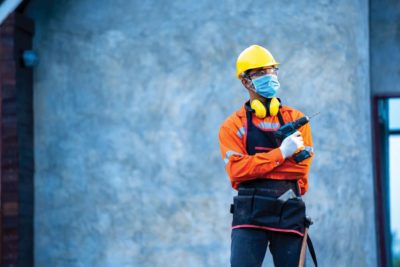According to the ELECTRI International report, “Pandemics and Construction Productivity: Quantifying the Impact,” the COVID-19 pandemic is estimated to have reduced productivity in the construction sector by some 20%, based on the additional time and effort associated with training, health screening, cleaning and disinfecting, PPE, social distancing, shift staggering, reduced crew sizes and new regulations. And that “new normal” can affect a contractor’s profit margin.
From product back orders and shipping holdups to price increases, labor shortages, project delays and more, the electrical contracting industry has navigated the unprecedented challenges of the past two years with steadfast resolve and a stoic determination to get the job done.
Three electrical contracting firms share their pandemic-era experiences and the current conditions that continue to present challenges.
Working through the changes
Bana Electric Corp., Farmingdale, N.Y.
As he looked back over their experience of the last two years, Stephen Bender, president of 67-year-old, full-service electrical contracting firm Bana Electric Corp., confirmed that “absenteeism and material shortages” were among the most difficult challenges his firm had to navigate.
“Although employees are required to take off 10 days because of illness or close contact, the job schedule doesn’t change and substituting new personnel is costly and disruptive,” Bender said. “At the same time, not having product in a timely manner or having to substitute product is also extremely costly.”
As of today, “some product is still hard to get and that doesn’t seem to be getting better; I don’t have any idea when things will get back to ‘normal,’ but I don’t expect that to happen anytime soon,” Bender said.
“From a corporate standpoint, however, we’ve relaxed all of our COVID-related protocols and none remain. Some employees still choose to wear masks, and some still work remotely, both of which are a personal choice. We have customers that still require masks and vaccines, and we comply with all customer requirements.”
While the nation’s contractors saw a varying degree of uptick or downturn in project activity over the past two years based on their segments served or clientele, “the pandemic hurt our business tremendously,” Bender said. “We’ve been very busy with the backlog, but the additional costs and hardships that COVID forced upon us greatly impacted our bottom line. Most of our work has fixed, lump-sum contracts that don’t allow us to recover the unprecedented material escalation we’ve experienced, and the lost productivity due to absenteeism has been impossible to recover.”
Labor shortages also remain an issue.
“We’re between large jobs right now, so we’re not currently seeking employees, but I expect that it will be a problem for us in the near future,” Bender said.
As for the positives that have fallen out of the last two years, Bender said that some of the proactive new practices Bana Electric established in response to the global public health crisis will likely remain in place long after the pandemic subsides.
“We instituted cross-training of employees, closer controls on day-to-day material and remote work for supervision,” he said. “We believe that these will benefit us long-term, pandemic or not.”
Adapting to a new paradigm
Cochran Inc., Tigard, Ore., branch
According to Ilene Ferrell, safety director at Cochran Inc., the pandemic affected the company and its thousand employees in a variety of ways.
Among the impacts they experienced, “many of our tenant-improvement projects were put on hold as people started working from home and businesses closed their doors, although we worked on ’essential’ construction projects through the height of the pandemic to minimize layoffs,” Ferrell said.
“Later on, scheduling became difficult when certain clients required vaccinated workers; we had to restructure our field crews to match project vaccination requirements, which meant replacing a foreman or crew members who started the project with others who met the requirements. The additional time to train and review project details with the new crews was an unforeseen cost on several projects.”
When the supply chain became affected, “products that were always known to be ‘long lead’ items had an unknown delivery status, and items typically ‘in stock’ are now difficult to get,” she said. “As one supplier put it, ‘Yes, it’s for sale, but it’s out of stock and we don’t know when we’ll have stock available.’”
Some of the most significant pandemic-era changes the Cochran team made to its operations involved meeting the required mandates to work in Oregon and Washington, which came from both governors’ offices, Oregon OSHA, Washington Labor and Industries and local health authorities.

A Cochran worker complies with pandemic-era protocols by wearing full PPE and a face covering while performing electrical upgrades in a healthcare facility. | Cochran Inc.
“Initially, social distancing and mask requirements brought new challenges,” Ferrell said. “For one thing, many electrical installations require two workers working side by side, not 6 feet apart, so additional PPE such as a face covering and a face shield were used in these instances. We also faced additional equipment costs from having to rent two scissor lifts instead of one to meet social distancing requirements.”
Other, softer impacts were felt throughout the company. “For instance, some communication was lost in our morning tailboard meetings and weekly safety meetings as crews had to stand further apart and often strained to hear what the leader was saying,” Ferrell said. “Masks caused safety glasses to fog over, which in turn caused most workers to not wear their safety glasses properly, which exposed them to potential eye hazards. For that reason, we appreciate the new anti-fog safety glasses manufacturers have designed. We also dealt with the complexities of notifying employees for contact tracing, reporting outbreaks and verifying employee vaccination status once vaccinations became available.”
Ferrell said that rising demand continues to challenge Cochran’s operations.
“When contractors can’t get parts, construction schedules get delayed, causing a stop-and-go sequence of installation, and, if work is performed out of sequence, it can create safety and quality issues unless there’s proper oversight and management,” she said. “Certain products are also hard to get, including Cat 6 plenum cable, items with copper plating, tools/components/devices with a computer chip, hard hats, light fixtures, electrical breakers, and lots of other items that have traditionally been available off the shelf.”
While the Cochran team practices good hand hygiene and stays home if they have symptoms of illness, Ferrell said that, per state guidelines, social distancing was relaxed in late June 2021 and face coverings were no longer required as of March 2022, except in certain types of facilities.
Along with a loss of some tenant improvement projects, “our work schedule is impacted when employees get infected or were in close contact, bidding new work is more competitive and costs have risen,” she said. On a positive note, “online meetings will continue to bring people together beyond the pandemic, eliminating the time and cost associated with travel and encompassing wider audiences in communications.”

Cochran employees worked in full PPE and face coverings to meet required pandemic-era mandates. | Cochran Inc.
Among key lessons learned at Cochran over the past two years is “adapting to changing conditions by focusing on what we can control has been critical for our business continuity,” Ferrell said. “And we’ve seen that removing or limiting social interactions and not being able to see facial expressions during meetings, lunch and the general course of the job impacts mental wellness over time. We’re thrilled to be seeing everyone’s smiling face again.”
Redefining “normal”
Rosendin Electric Inc., San Jose, Calif.
According to Rosendin COO Matt Englert, a more than century-old provider of design-build electrical systems, some of the biggest impacts the pandemic had on their firm of more than 7,000 employees were felt right up front.
“March 16, 2020, was the day that travel restrictions were implemented, work from home became the status quo and the Bay Area went shelter-in-place,” Englert said. “We grappled with changing policies and not knowing if projects were going to be canceled or what the future held in store for us. In many ways, our greatest challenge was the unknown.”
In response, “we had to create a social distancing policy and require all of our employees to wear masks to ensure everyone’s safety, which changed how job site transportation was managed and the way simple electrical tasks were performed,” he said. “Overall, the circumstances required us to be ‘excellent’ at managing COVID to ensure that we could provide a safe environment for our employees so that they in turn could provide for their families and friends.”
As for Rosendin’s business activity during the pandemic, “We have a very diverse work portfolio geographically and across a variety of industries, and we saw a slowdown in some markets, which were heavily developer-driven, such as commercial offices and high-rise residential buildings,” Englert said.
“While these markets contracted, however, the renewable energy, data center and semiconductor industries experienced rapid growth—a further reminder of our need to constantly look into the future and adjust with the market.”
While federally funded stimulus payments impacted the pool of labor available to them, “we were able to maintain and secure the labor we needed in high-wage markets, although labor was a bit more difficult to secure in lower-wage markets,” he said. “Now that the federal stimulus has subsided, we’re not experiencing the quantum labor shortages that were attributed to the pandemic.”
Today, while Rosendin continues to follow the various safety requirements and mandates regulated at the federal, state and local jurisdictions where they actively work, “the supply chain is currently erratic and may never get back to where it was two years ago,” said Englert, adding that he believes that contracting firms may end up redefining what “normal” is.
“We have to be vigilant, never cease asking questions, and always be looking for alternative solutions to the traditional supply chain.”
“Our key takeaway is to never stop looking for the silver lining in what can be perceived as a bleak situation, remain agile and keep pursuing new and emerging markets,” Englert said. “We’ll continue to create a culture that promotes our core values (We Care, We Share, We Listen, We Innovate, and We Excel), as we believe that this culture will attract a hungry, humble and smart workforce that will generate the best and brightest ideas the next time we’re faced with a new pandemic-level crisis.”
https://www.ecmag.com/section/safety/put-covid-test-ecs-share-pandemic-era-experiences-and-continuing-challenges


